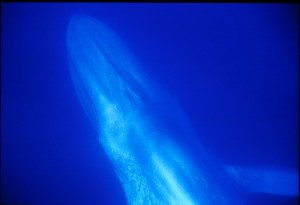Curt Jenner, Managing Director of CWR, recently responded to a reader who asked – What does studying blue whales and collecting this new information allow us to do for our planet?
Well, we believe this is as “big picture” as it gets. Our study examines the core ecosystem issues that drive the southern ocean in order to figure out why blue whales have been so slow in their recovery from whaling. Of all ocean creatures blue whales are the easiest to monitor – they make the loudest sound of any animal, are indeed the largest animal, plus they feed continuously on animals at the bottom of the ocean food chain everywhere from the poles to the equator. In other words they are the perfect sentinel.

Blue whales make perfect sentinels for the health of our oceans – they make loud noises so are easy to find and they depend on krill, the key species of ocean ecosystems. Photo credit: Micheline Jenner
Humans have inadvertently started a huge ocean-health experiment by decimating populations of the biggest animal on the planet, the blue whale. Perversely, we can now benefit from this lack of foresight by carefully monitoring the recovery of this unique species. The concept being that if our planet ocean is healthy, then these whales will recover – unfortunately its scientists’ recent opinion that they’re not.
So its clear that something is going wrong either where these whales breed, or where they feed – the basics of biology. But which is it, polar areas or equatorial areas, or both?
We will use the information and understanding we gain from our global spanning expeditions to educate individuals and governments about the health of our oceans and the value of having ocean sentinels. Our goal is to effect change in ocean management practices in directed areas – blue whale critical habitats must be recognised as global health hotspots. Right now the blue whales are telling us that we aren’t looking after these vital parts of our planet. Where are they? Who is responsible for managing them? Who has the power to make a difference? We need to get these messages and answers to the people who can make a difference.

No comments yet.